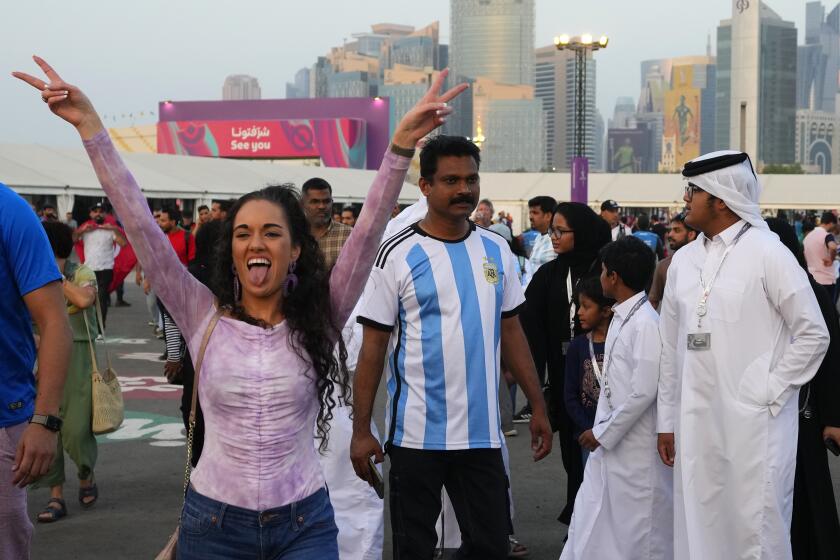Qatar’s ruler says his nation will vote on abandoning legislative elections after just one poll

- Share via
DUBAI — Qatar’s ruling emir said Tuesday that his small, energy-rich nation will hold a referendum on ending a short-lived experiment in electing members of the country’s advisory Shura Council.
Sheikh Tamim bin Hamad Al Thani offered no immediate timeline for the referendum in an annual address to the Shura Council, which drafts laws, approves state budgets, debates major issues and provides advice to the ruler. The body does not have sway over matters of defense, security and the economy.
However, it marks yet another rollback in the hereditarily ruled Gulf Arab states to embrace representational rule, however tentative, following efforts by the United States to push harder for democratic reforms in the Middle East after the Sept. 11, 2001, attacks and hopes for democracy in the region rose in the wake of the 2011 Arab Spring.
From its perspective, Qatar saw the one-time 2021 vote likely as increasing tensions among tribes and families in the country just months after a diplomatic crisis between Doha and four Arab nations ended.
Israel-Hamas war: In Qatar’s capital, a compound housing Palestinian medical evacuees from Gaza is a living catalog of what war does to the human body.
“We are all one family in Qatar,” Sheikh Tamim said, according to a transcript published by the state-run Qatar News Agency. “The contest between candidates for membership in the Shura Council took place within families and tribes, and there are different views regarding the repercussions of such competition on our norms, traditions, as well as the conventional social institutions and their cohesion.”
The emir added: “The contest assumes an identity-based character that we are not equipped to handle, with potential complications over time that we would rather avoid.”
The country’s electoral law distinguishes between born and naturalized Qatari citizens and bars the latter from electoral participation. Human Rights Watch described the system as “discriminatory,” excluding thousands of Qataris from running or voting. The disqualifications have sparked minor tribal protests that led to several arrests.
Qatar first introduced plans for the legislative elections in its 2003 constitution, but authorities repeatedly postponed the vote. The country finally held the vote to elect two-thirds of the Shura Council in October 2021, just after the end of a boycott of Qatar by Bahrain, Egypt, Saudi Arabia and the United Arab Emirates that tore the Gulf Arab states apart.
The tiny Persian Gulf nation initially had success persuading Hamas to give up hostages. Critics claim its influence and commitment have diminished.
The vote also came about a year ahead of Qatar hosting the 2022 FIFA World Cup, an event that drew intense scrutiny from the West on both Doha’s treatment of foreign laborers and its system of governance. Qatar remains an important nation to the West as it hosted the Taliban and assisted in the chaotic 2021 NATO withdrawal from Afghanistan and as a mediator as the Israel-Hamas war rages in the Gaza Strip and has expanded to Lebanon.
Qatar, like other Gulf Arab states, is ruled by a hereditary leader with ultimate say in how the country is governed. Before the oil industry roared into the Gulf and upended hundreds of years of governance, rulers led by consensus among their people.
The U.S. after the Cold War began a push for democracy in the Middle East, while carefully balancing its relationships with longtime client states it cultivated in its competition with the Soviet Union and its support of Israel. That push strengthened under then-President George W. Bush after the 9/11 attacks, which saw Gulf Arab states make tentative moves toward some type of representation.
The U.S. State Department did not respond to a request for comment over the announcement by Qatar, home to the massive Al-Udeid Air Base that hosts the forward headquarters of the U.S. military’s Central Command.
Governance by consensus is something Gulf rulers attempt to maintain even today even as some sit atop vast sums of oil and gas wealth that have transformed their countries.
Qatar’s rise on the world stage aims to achieve new heights with the World Cup, but can the country’s ambitious plans mesh with its traditional culture?
Sheikh Tamim alluded to that in his speech Tuesday, maintaining that “the Shura Council is not a representative parliament in a democratic system.”
“In Qatar, the people and the government have a direct civic relationship, and there are recognized norms and mechanisms for direct communication between the people and the governance,” he said.
But it’s not just Qatar rolling back on its experiment in representational government. In May, the ruler of oil-rich Kuwait dissolved his country’s parliament for as much as four years. While the Kuwaiti parliament had struggled, it represented the Gulf Arab state’s most free-wheeling legislative body and could challenge the country’s rulers.
Over a decade on from the 2011 Arab Spring protests, “we’ve seen this kind of retreat coming for some time,” said Kristin Smith Diwan, a senior resident scholar at the Arab Gulf States Institute in Washington.
“It’s important to recognize there has been a debate on this and there was a popular push from below for more representation and accountability,” Diwan said. “But it seems like that moment has passed.”
Gambrell writes for the Associated Press.
More to Read
Sign up for Essential California
The most important California stories and recommendations in your inbox every morning.
You may occasionally receive promotional content from the Los Angeles Times.













